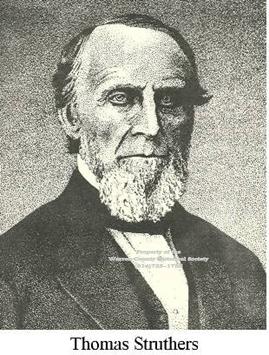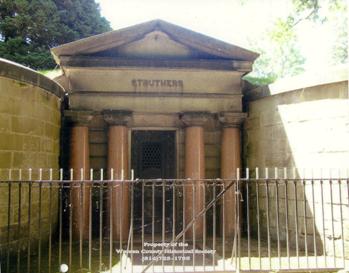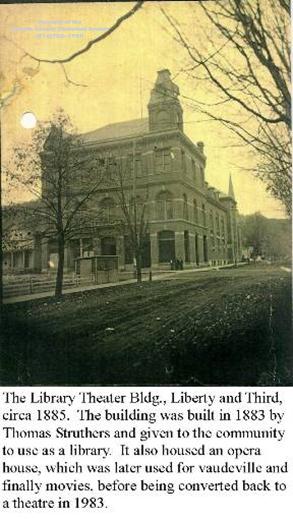
Thomas Struthers

At one time the wealthiest man in Warren, Thomas Struthers was born in Ohio in 1803. His parents were some of the earliest settlers in that territory, and Struthers grew up on his father’s farm. He went to college and became a lawyer, and in 1828 he moved to Warren. In Warren, he practiced law, but earned most of his money buying and selling land. By buying large pieces of land inexpensively and paying for only part of the land at the time, Struthers was able to sell the land for more money, pay off his debt for the land, and still make a profit.
In order to make the land in this area more valuable, Struthers hoped to bring a railroad to Warren County. A railroad would allow people to transport things into and out of the area quickly and inexpensively. If the lumber on the land that Struthers owned was easier to take to markets outside of  Warren County, then the land would be very valuable when Struthers sold it. Beginning in the 1830s, Struthers worked to bring a railroad to Warren. It was a long, hard struggle and it was not until 1859, over twenty years after he started working on the project, that the Philadelphia & Erie Railroad finally arrived in Warren. Struthers’ railroad and the railroads that followed helped make Warren a wealthy community. Struthers became active with many other improvement schemes over time, including the building of other railroads, the improvement of rivers for navigation, and the building of street railways in places as diverse as Ohio, Iowa, and California.
Warren County, then the land would be very valuable when Struthers sold it. Beginning in the 1830s, Struthers worked to bring a railroad to Warren. It was a long, hard struggle and it was not until 1859, over twenty years after he started working on the project, that the Philadelphia & Erie Railroad finally arrived in Warren. Struthers’ railroad and the railroads that followed helped make Warren a wealthy community. Struthers became active with many other improvement schemes over time, including the building of other railroads, the improvement of rivers for navigation, and the building of street railways in places as diverse as Ohio, Iowa, and California. 
Struthers built one of the most beautiful buildings in the borough of Warren, and gave it to the community. This building is the Struthers Library Theater, on the corner of Liberty and Third Streets. Before 1883, the community of Warren had no permanent library. Struthers felt so strongly that Warren needed a library that he offered to build one and give it to the community. Struthers thought that the building could also be a theater, and that the money from the theater could be used to support the library. Today, the library has been moved to Market Street, but the theater part of the building is still used as a theater, over one hundred years after it was built.
Courtesy of the Warren County Historical Society